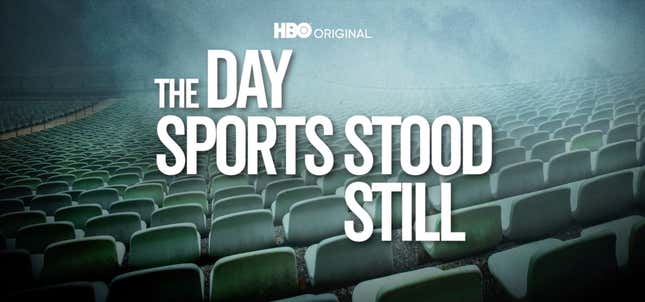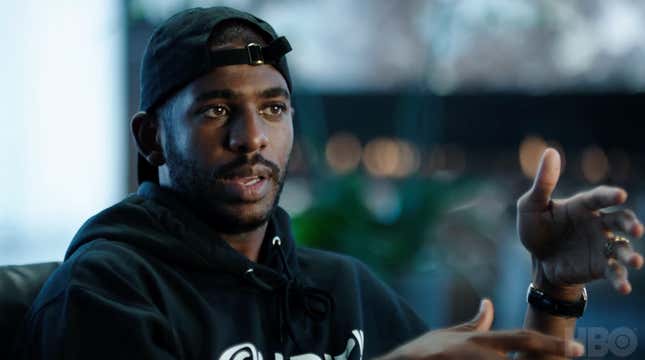
For as far back as I can remember, I’ve always had a symbiotic relationship with sports.
Whether it was throwing the football around in my neighbor’s backyard as a child, or getting clowned at basketball tryouts as an 8th grader because my sneakers had holes in them, or my father chasing me around the house with a broom after my Orlando Magic got swept in the 1995 NBA Finals, in the deepest recesses of my mind, I can’t recall a single time in my entire life that wasn’t defined by my love affair with competitive sports.
But on March 11, 2020, like every other facet of our lives, that changed.
Prior to the Utah Jazz’s regular-season matchup against Chris Paul’s Oklahoma City Thunder, Jazz center Rudy Gobert tested positive for COVID-19; a mere 48 hours after recklessly mocking the virus by touching every microphone and table in sight during a post-game press conference.
Gobert’s diagnosis would come as a complete shock to the entire league, and serve as the catalyst for something completely inconceivable at the time: the indefinite suspension of the NBA; and in turn, the indefinite suspension of professional sports leagues throughout the world in its immediate aftermath.
HBO’s new documentary, The Day Sports Stood Still, revisits the impetus of the horror story that still continues to terrorize our everyday lives—the coronavirus pandemic—but from the perspective of the athletes themselves. I have vivid memories of getting an ESPN alert on my phone that we were officially living in a world without NBA basketball, but finally hearing superstar players like Donovon Mitchell and Chris Paul detail exactly how it all played out put my jaw on the floor.
But it doesn’t stop there.
An assortment of premiere players throughout the leagues we all know and love, including WNBA guard Natasha Cloud, MLB superstar Mookie Betts, NBA All-Star Karl Anthony Towns, LGPA golfer Michelle Wie, and NHL wing Ryan Reaves, who share their own stories of what it was like throughout the various stages of the pandemic: Cloud revisits her escape from China, where she plays during the WNBA off-season, and the guilt she felt in “abandoning” her teammates by sitting out the 2020 season. Betts grapples with the difficulties of addressing the deaths of George Floyd and Breonna Taylor in a league where he’s more often than not the only Black face in sight. Wie reveals the fear and anxiety she felt while trying to elude the coronavirus while pregnant. Towns talks about how he lost his mother to COVID-19, and a piece of himself in the process.
For me, one of the most frustrating things about the pandemic was being unable to go to the gym and work out. I spent almost the entire year scouring both the Internet and Los Angeles for kettlebells and workout equipment to no avail. So one of the scenes in the movie that really resonated with me was watching professional athletes, who traditionally have access to the best trainers and equipment in the entire galaxy, suffer a similar fate. Watching NBA players dribble in their hallways around chairs, while athletes from other sports climb across kitchen counters, use their pets and children as weights, and converse with their trainers via zoom hit a little too close to home.
But the best moments of the film come from the transparency we get from Chris Paul. Watching him jump in a plane to fly home, then have to sit in his car in his own driveway while eating the dinner that his wife brought out for him as he awaits his coronavirus test results, was eye-opening; as was watching the relief wash over his son after Paul informs him that he’s tested negative—right after his son refused to hug him.

We even get a glimpse into the NBA’s bubble, the Orlando, Fla., fortress that the league erected in order to crown a champion for the 2019-20 season; where Paul brings a keyboard so that he can learn to play his daughter’s favorite Lizzo song and brings a Playstation so that he can continue to bond with his son.
Touching moments like these are prevalent throughout this film, proving The Day Sports Stood Still is so much more than merely a doc about sports, it’s a testimony about our shared humanity. This is something Paul addresses at the end of the film when he explains why he’s so committed to using his platform to serve as a catalyst for change.
“My kids affect a lot of the decisions that I make,” he begins. “Especially as far as the decisions that we were making as far as playing in the bubble. A lot of the decisions that are made are like, ‘How are they gonna feel as far as being comfortable with making decisions for their generation?’”
He continues, “Some of the things that we want to see changed right now? It’s a process. So even if I don’t get the opportunity to see the benefits of the change—the discussions, the activism that’s occurring. For my kids to see it, it will be their normal.”
And as we continue to navigate our way through the darkness, through this coronavirus and unyielding social unrest, it’s more important than ever that athletes wield their power responsibility and don’t just shut up and dribble.
The Day Sports Stood Still is available now on HBO Max.

